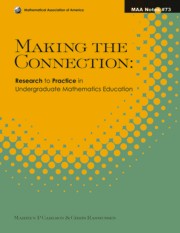Book contents
- Frontmatter
- Preface
- Contents
- Part 1 Student Thinking
- 1a Foundations for Beginning Calculus
- 1b Infinity, Limit and Divisibility
- 5 Developing Notions of Infinity
- 6 Layers of Abstraction: Theory and Design for the Instruction of Limit Concepts
- 7 Divisibility and Transparency of Number Representations
- 1c Proving Theorems
- 8 Overcoming Students' Difficulties in Learning to Understand and Construct Proofs
- 9 Mathematical Induction: Cognitive and Instructional Considerations
- 10 Proving Starting from Informal Notions of Symmetry and Transformations
- 11 Teaching and Learning Group Theory
- 12 Teaching for Understanding: A Case of Students' Learning to Use the Uniqueness Theorem as a Tool in Differential Equations
- Part 2 Cross-Cutting Themes
- About the Editors
11 - Teaching and Learning Group Theory
from Part 1 - Student Thinking
- Frontmatter
- Preface
- Contents
- Part 1 Student Thinking
- 1a Foundations for Beginning Calculus
- 1b Infinity, Limit and Divisibility
- 5 Developing Notions of Infinity
- 6 Layers of Abstraction: Theory and Design for the Instruction of Limit Concepts
- 7 Divisibility and Transparency of Number Representations
- 1c Proving Theorems
- 8 Overcoming Students' Difficulties in Learning to Understand and Construct Proofs
- 9 Mathematical Induction: Cognitive and Instructional Considerations
- 10 Proving Starting from Informal Notions of Symmetry and Transformations
- 11 Teaching and Learning Group Theory
- 12 Teaching for Understanding: A Case of Students' Learning to Use the Uniqueness Theorem as a Tool in Differential Equations
- Part 2 Cross-Cutting Themes
- About the Editors
Summary
Abstract algebra is an important course in the undergraduate mathematics curriculum. For some undergraduates, abstract algebra is the first mathematics course in which they must move beyond learning templates and procedures for solving common classes of problems (Dubinsky, Dautermann, Leron, and Zazkis, 1994). For most undergraduates, this course is one of their earliest experiences in coping with the difficult notions of mathematical abstraction and formal proof. Empirical research studies attest to students' difficulties in abstract algebra; these studies have shown that many students do not understand fundamental concepts in group theory (e.g., Leron, Hazzan, and Zazkis, 1995; Asiala, Dubinsky, Mathews, Morics, and Oktac, 1997) and have difficulty writing proofs in a group theoretic context (e.g., Selden and Selden, 1987; Selden & Selden, this volume; Hart, 1994; Weber, 2001; Harel & Brown, this volume) after completing an abstract algebra course. The purpose of this chapter is to use the research literature to illustrate some of undergraduates' difficulties in group theory, the primary content area in most abstract algebra courses, and to describe alternative forms of pedagogy that may be useful in overcoming these difficulties.
Undergraduates' Difficulties in Group Theory
In this section, we present four episodes that illustrate undergraduates' difficulties in understanding and reasoning about concepts in group theory. We will begin each section by presenting an excerpt from a clinical interview in which undergraduates were asked to describe a concept in group theory or complete a group theoretic task.
Information
- Type
- Chapter
- Information
- Making the ConnectionResearch and Teaching in Undergraduate Mathematics Education, pp. 139 - 152Publisher: Mathematical Association of AmericaPrint publication year: 2008
Accessibility standard: Unknown
Why this information is here
This section outlines the accessibility features of this content - including support for screen readers, full keyboard navigation and high-contrast display options. This may not be relevant for you.Accessibility Information
- 9
- Cited by
